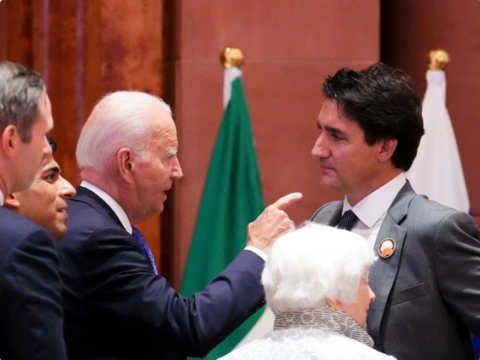In The Line, Michael Den Tandt explains why the Biden option isn’t a viable one for Justin Trudeau at this stage of the Canadian electoral cycle:
It’s a tough time to be a backbench Liberal MP in Canada, yes? The tone, emerging in anonymous leaks to reporters, is grumpy, surly, unhappy. This is unsurprising. We’re in year ten of a ten-year political cycle that feels stretched and road-beaten, by any standard.
Plus, to our south, there’s this shining model now of the transformative power of change. One day President Joe Biden is clinging by his fingernails to his party’s nomination, with the convicted felon Donald Trump seemingly headed for a big win in November. The next, Biden’s out, new hope Kamala Harris is raising tens of millions in campaign donations, and reporters are lasering in on Trump’s highly quotable running mate, J.D. Vance.
All in a week. So, couldn’t something similar happen in Ottawa? Couldn’t Prime Minister Justin Trudeau take a step back, hit the beach or the lecture circuit, make way for fresh blood, and at least give the Liberals a shot at survival in 2025? What’s he waiting for?
Anything is possible. But this scenario is unlikely. That’s because Justin Trudeau isn’t Joe Biden; Chrystia Freeland isn’t Kamala Harris, and Canada isn’t the United States.
Most obviously, the cycle: The cycle is everything. Individuals are all but powerless in its clutches. As it nears a decade it adds lead weights, like those a deep-sea diver might wear, to the feet of Canadian incumbents. Even the most promising of change agents — former prime minister and justice minister Kim Campbell is Exhibit A — will be brought low by its power.
The argument can be made made that the Progressive Conservative party’s obliteration in 1993 (reduced from majority status to two seats) was not just due to late-cycle fatigue, that Campbell herself had run a wobbly campaign. Some will note the deep weariness with the constitutional wrangling that dominated Canadian discourse during the Brian Mulroney years, or the hangover of Mulroney’s, at the time, keen personal unpopularity. Fair points.
But underlying those events was still the implacable cycle — as in 2006, when prime minister Paul Martin, having seen that Liberal government reduced to a minority in 2004 (despite his personal popularity at the time), lost power to a rising Stephen Harper. In the throes of the federal sponsorship scandal (I will spare you the details, but you can find them here if you’re interested in the arcana), Martin was described by gifted wordsmith Scott Reid, then his communications director, as “the wire brush” who would scrape away the stain of sponsorship. It was a bold attempt to rhetorically seize the change wave. But the wave was strong and Martin lost.




